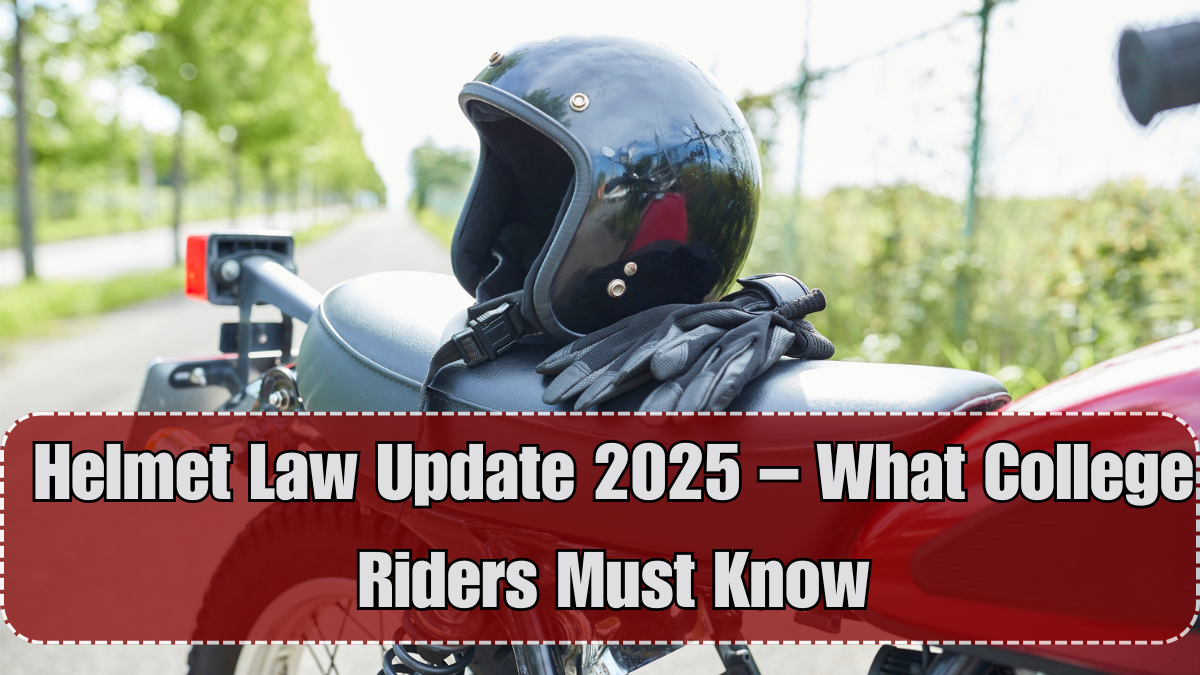Helmet Law Change India 2025 has taken a major leap forward this academic year, especially targeting students riding two-wheelers on or around college campuses. Several Indian states, including Karnataka, Maharashtra, Tamil Nadu, Delhi, and Rajasthan, have tightened helmet regulations for young riders, including mandatory use of BIS-certified helmets and increased fines for non-compliance.
This reform aims to enhance campus riding compliance, after several surveys showed a rise in student road accidents due to helmet negligence. The updated helmet law India now applies not only to riders but also to pillion passengers, regardless of distance or location. With educational institutions and local traffic police working in tandem, stricter enforcement is already in place near universities and technical colleges.

What Has Changed in the Helmet Law for Students?
Under the Helmet Law Change India 2025, the Ministry of Road Transport and Highways has made it compulsory for college-going students to wear certified helmets when riding or being pillion on any powered two-wheeler, including electric bikes. Fines have also doubled in most cities and traffic zones near colleges.
Key changes include:
-
Mandatory BIS-certified helmet for rider and pillion
-
Full-face helmets recommended for students below 21
-
Helmet straps must be properly fastened—loose helmets are considered violations
-
Campus security empowered to report violators
-
Fine increased to ₹1,000 for first-time offence; ₹2,000 and license seizure for repeat offenders
These new norms apply to all private and college-registered vehicles operating within 1.5 km of any academic institution.
Table: Helmet Law Change India 2025 – State-wise Implementation for Students
| State | Key Regulation Highlights | Fine (₹) | Enforcement By |
|---|---|---|---|
| Karnataka | Helmet rule applies even for <1km campus rides | 1,000 – 2,000 | College patrol + traffic |
| Maharashtra | Full-face helmet compulsory below age 21 | 1,000 | Traffic police |
| Tamil Nadu | Helmet rule extended to female pillion passengers | 500 – 2,000 | RTO squads + CCTV alerts |
| Delhi | Helmet check at college gates, strict enforcement | 1,000 + seizure | Campus marshals + police |
| Rajasthan | Warning + fine model for first offence | 500 – 1,500 | Local traffic branches |
These laws are being enforced not just through traffic stops but also through facial recognition and helmet detection systems in smart campuses.
Why the Helmet Law Is Being Enforced Strictly on Campuses
The helmet law India update is a response to alarming accident statistics involving student bikers. In 2024 alone, nearly 38% of all youth road fatalities were linked to two-wheeler accidents without helmet usage. The revised 2025 law aims to correct this dangerous pattern by making helmet compliance a non-negotiable habit.
Reasons for the crackdown:
-
Increased youth accidents near college zones
-
Helmet misuse despite awareness drives
-
Pressure from parents and educators on student safety
-
Integration of road safety into campus policies
-
Urban two-wheeler boom due to rising EV popularity among students
With the new policy, many colleges have started denying parking access to students who do not wear helmets.
Colleges Supporting Helmet Compliance
To ensure campus riding compliance, colleges are now participating actively in helmet enforcement and safety promotion. Institutions are organizing awareness rallies, issuing on-campus challans, and conducting safety audits.
Colleges are also offering:
-
Free or discounted BIS-certified helmets to new students
-
Helmet lockers on campus
-
Helmet awareness drives during orientation weeks
-
Tie-ups with traffic departments for helmet camps
-
Compulsory helmet checks before cultural and sports fests
This collaboration between government and educational bodies is a big push towards safe and responsible youth mobility.
How the Helmet Law Impacts Students Positively
While many students initially viewed the helmet law India changes as restrictive, attitudes are shifting. With education campaigns, peer awareness, and real-life accident case studies, the law is now seen as life-saving rather than punitive.
Benefits of the new law for students:
-
Reduced head injury and fatality risk during daily commute
-
Better riding discipline among young motorists
-
Awareness of traffic rules from an early age
-
Safer campus environment for all road users
-
Legal clarity and support from colleges and guardians
The Helmet Law Change India 2025 is not just about enforcement—it’s about building a safety-first culture on Indian campuses.
FAQs
What is the Helmet Law Change India 2025?
It’s an updated helmet rule mandating all students riding or sitting on two-wheelers to wear BIS-certified helmets, with increased fines for violations.
Does the helmet rule apply to pillion riders?
Yes, the rule is mandatory for both riders and pillion passengers, including on campus roads.
Can I be fined even if I’m riding inside college premises?
Yes, enforcement covers roads within and around colleges, especially within 1.5 km radius.
Is any specific type of helmet required?
Only BIS-certified helmets are permitted, and full-face helmets are recommended for students below 21.
What happens if I’m caught twice without a helmet?
A second offence can lead to higher fines and even temporary seizure of your driving license.
Are there any colleges giving helmets to students?
Yes, many colleges are now offering free or discounted helmets as part of safety initiatives during admission or orientation.
Click here to know more.



